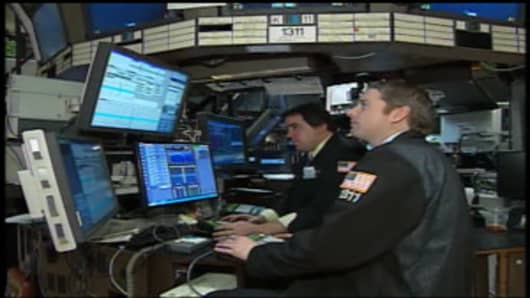There will likely be some relief on Wall Street after it appeared that Hurricane Gustav hadn't damaged the Gulf Coast as badly as many feared — and in turn sent oil prices falling sharply.
But trading may nonetheless be uneven when the market reopens Tuesday after the long holiday weekend, as it may take some time until all the damage reports are in.
The market knows from experience that infrastructure problems can emerge long after a hurricane strikes; early reports following Katrina's landfall in 2005 erroneously said the flooding in New Orleans was not going to be problematic.
Moreover, while lower oil prices help consumers and most businesses, they weaken the stocks of energy and other commodities-related companies. Those stocks fell in overseas trading Monday after crude fell below $111 a barrel in electronic trading on the New York Mercantile Exchange, and their declines will weigh on the Dow Jones industrials and other indexes.
Perhaps most important, the hurricane season — which officially lasts until the end of November — can have other, broader influences on the U.S. economy. Katrina did not hurt the stock market in a big way back in 2005, but the economy is much weaker now than it was then, and any fallout from Gustav may therefore be more serious.
"Hurricanes have a wide-reaching impact," said Quincy Krosby, chief investment strategist at The Hartford. "Anything that taxes the consumer will obviously be a negative for the economy."
Sellers of basic home goods such as Home Depot Inc., Wal-Mart Stores Inc. and Lowe's Cos. might see a boost, she said, as people buy items to repair their houses and prepare for future storms. But the storm could take a toll on other retailers — especially as consumers grapple with a feeble housing market and the prospect of a cold winter that could send fuel prices soaring again.
"You'll want to see the effect on the consumer," Krosby said. "Back-to-school sales are a good harbinger of the all-important holiday season."
The insurance industry, which lifted fees and in some cases pulled out of certain regions after Katrina, could also take a hit. Many insurers are still struggling with their ill-timed bets on mortgage-backed securities; several were also battered earlier this year when thunderstorms flooded the Midwest.
Investors are concerned about the effects of Gustav — and other storms like Tropical Storm Hanna that could strike the Southern United States — on the housing market. Housing so far has exhibited only sparse signs that it is close to bottoming out, an inauspicious situation for the banks and brokerages facing down more credit-related losses.
Some of the biggest drops in home prices and housing demand have been in Florida, a frequent target for Atlantic storms.
"What this does is, it reminds people of real estate in areas that are vulnerable," Krosby said. "You start rethinking the attractiveness of certain areas."
On Monday, the U.S. markets were closed for the Labor Day holiday, but the stock markets in Asia and Europe fell.
Last week, the Dow Jones industrial average, the Standard & Poor's 500 index and the Nasdaq composite index all finished lower. The volatile week was capped off by Friday's news of a drop in personal incomes and disappointing profits at the computer maker Dell Inc.


